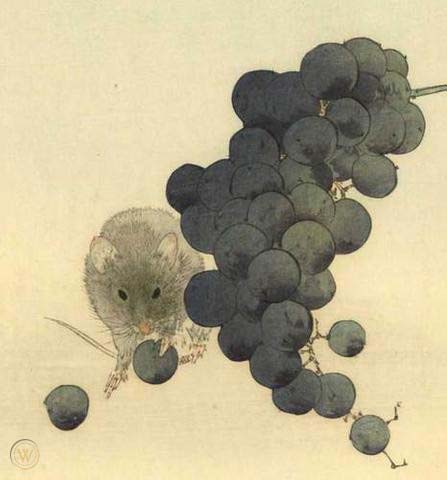
(Organic) Wine consumption in the Corona crisis
Figures, data and facts on Austrian wine consumption in the Corona crisis
July 2020
© Painting: Watanabe Shōtei aka Watanabe Seitei (Japanese 1851–1918) Mouse and Grapes, approx. 1910
Online translation with DeepL
Austrian figures, data and facts on (organic) wine consumption in the Corona crisis and possible opportunities.
Sometimes it is quite easy with the content for my column when it literally falls into your lap. Karin Schuh writes in the Austrian daily "Presse am Sonntag" about wine consumption in the crisis. Perfectly placed. I am happy to take over, as I am currently dealing with certifications on the wine market again and my research has also revealed the following figures:Vienna has by far the largest share of organically cultivated vineyard area in the country with 33.7 percent, the Austrian average is 14.2 percent. This makes us the world leader, by the way, followed by Spain with 13 percent. Vienna is followed by Burgenland with 17.1 percent, Styria and Lower Austria are between 12 and 13 percent. The organic area - without distinguishing between organic and biodynamic - is growing steadily, in 2000 it was still 1.8 percent.
Three-quarters of the Austrian wine production is drunk in the country, but Karin was unable to research how large the organic portion is. However, the proportion of natural wines (organic, biodyn, natural, orange) exported to some countries can be measured and is large, with an upward trend. Great Britain and Scandinavia are the leaders, for some of which certification is already an entry criterion. But back to Austria.
Winegrowers with strong export markets are feeling the crisis particularly hard, but the Austrian main customer, the gastronomy, has also disappeared. 58 per cent of the domestic wine production is sold there, that is 137 million litres. 23 million litres remained in the cellar during the lockdown. Logically, only a very few people can be happy with the emergency solution of spraying to disinfectants. Austria has never positioned itself in the cheap niche and will certainly not do so now.
Fritz Wieninger, respekt-BIODYN winemaker and my very favourite ex-boss, sees the full stocks as a chance to let the wines age there and to bring them to the market and the wine lists more mature. It would be a chance to get away from the hype of drinking the wines so young. That would really be desirable. But, you just have to be able to afford the full stock and for some winegrowers it will be tight in autumn at the latest, when space is needed for the new wine.
Of course, online trading has also become indispensable in Austria. Wineries that did not have a shop before have upgraded in the meantime. Thank God, sales in the private sector rose significantly during the crisis, and the yard sale saves many people's liquidity. Because even though the effort is greatest in this sector due to the small-scale nature of the business, so are the margins.




